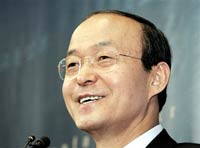Leaders of North and South Korea to hold second-ever summit
The leaders of North and South Korea will meet this month for the second time since the peninsula's division after World War II, the two countries announced Wednesday, capitalizing on progress in shutting down the North's nuclear program.

North Korean leader Kim Jong Il and South Korean President Roh Moo-hyun will meet Aug. 28-30 in Pyongyang, North Korea's capital, South Korean presidential security adviser Baek Jong-chun told reporters.
At the first North-South summit, Kim met then-South Korean President Kim Dae-jung in June 2000, also in Pyongyang.
"The second inter-Korean summit will contribute to substantially opening the era of peace and prosperity between the two Koreas," South Korea's presidential office said in a statement.
The two Koreas remain technically at war since the 1950-53 Korean War ended in a cease-fire, not a peace treaty, but the 2000 meeting led them to embark on economic cooperation projects and stage reunions of thousands of relatives split by their shared border - the world's most heavily fortified.
Kim Dae-jung won a Nobel Peace Prize for his efforts to engage North Korea, but the achievement was tainted by later revelations that South Korea made secret payments to foster the meeting.
Kim Jong Il believed the timing was right for a second meeting due to the state of relations between the two Koreas and the improved regional situation, South Korean National Intelligence Service head Kim Man-bok quoted his North Korean counterpart as saying earlier this month. The South's spy chief twice visited the North to arrange the summit.
The summit comes amid optimism on the peninsula as North Korea has made strides in abandoning its nuclear weapons program, including shutting down its sole operating nuclear reactor last month in exchange for oil aid. The United States and other regional powers are negotiating with the North on a timeline for the communist nation to declare all its nuclear programs and disable the facilities.
The South's Baek said the summit would help achieve progress in resolving the nuclear standoff and in relations between the Koreas, including the establishment of a peace regime on the peninsula.
Under agreements at the international nuclear talks, the main countries involved in the Korean War - also including the United States and China - are to begin discussions on a possible resolution of the 54-year-old cease-fire.
However, North Korea has consistently refused to engage South Korea on the nuclear standoff during regular meetings between the two sides. Pyongyang views the nuclear issue as a dispute solely with Washington - making it unlikely that a summit would achieve any further arms breakthroughs.
Kim Jong Il promised in 2000 to make a return visit to South Korea for a second summit. But Kim Man-bok said Roh had accepted North Korea's proposal for Pyongyang as the venue.
Roh, a former human rights lawyer who took office in 2003, has repeatedly said that he would meet with Kim at any time and any place and there has been persistent talk this year that a summit was possible. The conservative opposition Grand National Party blasted such potential plans, however, calling them an election ploy ahead of South Korea's December presidential vote.
Roh, 61, is set to leave office in February and has seen his popularity plummet amid perceptions he has bungled handling of the economy and security policies.
On Wednesday, the Grand National Party renewed its opposition to a summit as a political move aimed at bolstering the embattled liberals.
"At this point, there is nothing to expect from the summit," party spokeswoman Na Kyung-won said in a statement.
At the first summit, Kim Jong Il warmly greeted his South Korean counterpart on the tarmac immediately upon landing, showing a human side of the reclusive North Korean leader known for his trademark jumpsuit and sunglasses. The 65-year-old leader assumed power in 1994 after the death of his father, North Korea's founding ruler Kim Il Sung, who technically remains the country's president.
Since then, the countries have launched a joint industrial zone in North Korean border city of Kaesong, bringing together South Korean know-how and cheap North Korean labor. More than 17,000 relatives split by the border have met in brief tearful reunions, and roads and rail lines have been reconnected across the frontier.
Subscribe to Pravda.Ru Telegram channel, Facebook, RSS!


